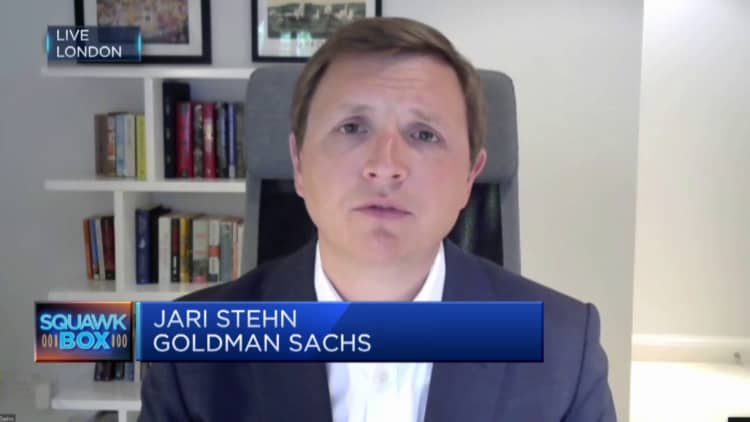LONDON — The Bank of England is expected to hike interest rates for the fifth consecutive monetary policy meeting on Thursday, as it looks to rein in soaring inflation against a backdrop of slowing growth and a deteriorating currency.
At its May meeting, the Bank raised its base rate by 25 basis points to 1%, its highest level for 13 years, but warned that the British economy risks falling into recession.
Since then, fresh data has shown that U.K. inflation soared to a 40-year high of 9% annually in April as food and energy prices spiraled, and the country faces a major cost of living crisis. The Bank expects inflation to rise above 10% later this year.
Meanwhile, the economy unexpectedly shrank by 0.3% in April after a 0.1% contraction in March, the first back-to-back declines since April and March 2020.
The Organisation for Economic Co-operation and Development has forecast that the U.K. will be the weakest G-7 economy next year, as higher interest rates, tax increases, reduced trade and soaring food and energy costs weigh on households.
The OECD projects that the British economy will grow by 3.6% this year before stagnating in 2023.
Some market participants are now calling for the Monetary Policy Committee to implement a 50-basis-point hike on Thursday.
'No good options'
Sterling is down more than 10% against the dollar year-to-date, trading at just above $1.20 on Wednesday.
Laith Khalaf, head of investment analysis at British stockbroker AJ Bell, said any sign of dovishness could weaken the currency further.
"By raising interest rates, the Bank is putting the brakes on an economy that is already slowing of its own accord. That risks the economy stalling, or worse, going into reverse," Khalaf said in a note.
Finance Minister Rishi Sunak announced a package of measures late last month aimed at alleviating the cost of living crisis for households. This included a windfall tax on oil and gas majors that the government had long opposed previously, and Khalaf suggested that the fiscal moves free up some breathing space for the Bank of England to raise rates.

"Consumers probably won't be best pleased to find that some of the fiscal giveaways they have been handed by the Chancellor are going to be gobbled up by higher borrowing rates, but if the Bank fails to take action and the pound comes under further pressure, that also adds to the cost of living crisis, by pushing up the price of commodities priced in dollars, especially fuel," he said.
"It feels like there are simply no good options in front of the Bank of England."
The U.S. Federal Reserve on Wednesday announced its sharpest rise in interest rates for almost 30 years after the U.S. consumer price index blew past economist expectations to climb by an annual 8.6% in May.
Labor market
By and large, headline labor market statistics have remained relatively robust, with job vacancies rising to a record 1.3 million and employment reaching 75.6% in the three months to April, according to the Office for National Statistics.
However, some economists are beginning to spot signs of weakness that could deter the central bank from persisting with aggressive rate hikes. The Bank of England has cited labor market conditions as another key factor in its decision-making in recent months.
"As most data are based on three month averages, they still partly reflect the robust economy in February – that is, ahead of the Russian invasion of Ukraine and the intensification of COVID restrictions in China which have tanked confidence and throttled real activity since March," Berenberg senior economist Kallum Pickering said in a note Tuesday.

Although single-month data is volatile, Pickering suggested that it warrants attention in this instance and that the monthly unemployment estimate could be a cause for concern, having jumped to 4.2% amid a 240,000 monthly rise in unemployment in April.
"As the accompanying 250k monthly drop in employment is well within the normal monthly volatility of that series, and with inactivity largely moving sideways, the unemployment spike may well be a one-off," Pickering added.
"Indeed the further decline in the claimant count rate in May to 4.0% from 4.1% in April amid a 20k fall in claimants does not point to a trend of rising unemployment in coming months. The data are puzzling to say the least, but given the serious recession risk facing the UK (40%) we need to keep an eye on such trends in coming months."

